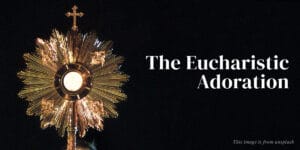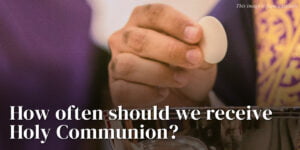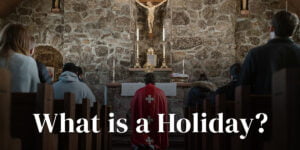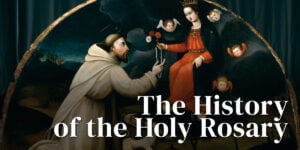Q: What is the Holy Eucharist?
A: The Holy Eucharist is one of the seven sacraments that our Lord Jesus Christ instituted. It is the most important sacrament because it is the Body and Blood of Christ in the form of bread and wine. The word Eucharist is from the Greek word “eucharistia” which means “thanksgiving”.
Q: When did Christ institute the Holy Eucharist?
A: He instituted the Holy Eucharist during the Last Supper with His apostles.
Q: If we say thanksgiving, it means we can celebrate the Holy Mass in a joyful way. Why the traditional Catholics does not like the Novus Ordo Mass’ joyful celebration?
A: Yes. Thanksgiving may be a joyful occasion. But, the Holy Mass is different from other celebrations. The Holy Mass is a Holy Sacrifice and it must be solemn. During the ministry of St. Peter and the other apostles, there are people who celebrate the Mass in a joyous way but get drunk. One of the examples is the Corinthians that St. Paul the Apostle rebuke in his letter.
Q: Why it is called the Holy Sacrifice?
A: It was called Holy Sacrifice because during the Holy Mass, the sacrifice of our Lord on the Cross is happening. Some priest and faithful forgot about it or it’s because they are lack of catechism, they didn’t know that the first Holy Mass does not end in the Last Supper, but continues in the passion, crucifixion, death and the resurrection of Lord. But some only knows the Last Supper and resurrection, including our Priests.
Q: Is Jesus Christ dying again during the Mass?
A: No. God is beyond time, and our Lord Jesus Christ is God, so He is beyond time. While the Mass is happening, we are like travelling in time during His passion and death, but not physically. Our Lord only died once, and He will not be killed again. However, He continues to suffer because of our sins.
Q: The Mass was celebrated on Sunday because this is the day that Christ was risen. It means the celebration is about His risen from the dead. Is this true?
A: Yes, but we Catholics especially the church teaches the passion and death of our Lord to save us from our sin, as St. Paul the apostle stated in his letter (1 Corinthians 11:27)
Q: How did the bread and wine become the Body and Blood of Christ?
A: It becomes the Body and Blood of Christ during the consecration. But the appearance and taste of the bread and wine remains unchanged. This is called “Transubstantiation”.
Q: Is the Eucharist only a symbol as protestants taught?
A: No. Our Lord clearly said “This is my Body”. This is the reason why the apostles and the previous Christians consecrated and give reverence to the Sacred Host. It is not just a bread; it is truly the Body and Blood of Christ.
Q: Why the traditional Catholics teach that the faithful cannot touch the Eucharist except for the Priest?
A: Because only the Priest has consecrated hands. The faithful, nuns and the lay ministers are not allowed to touch it except by the tongue. Even the Priest said that he gave the lay ministers the power to hold it, this is not valid.
According to the Book of Canon Law of the Church:
Can. 900 §1. The minister who is able to confect the sacrament of the Eucharist in the person of Christ is a validly ordained priest alone.
Can. 910 §1. The ordinary minister of holy communion is a bishop, presbyter, or deacon.
From the previous councils:
“The fact that only the priest gives Holy Communion with his consecrated hands is an Apostolic Tradition.”
The Council of Trent
“Forbade the faithful to take the Sacred Host in their hand, threatening transgressors with excommunication.”
6th Ecumenical Council, at Constantinople.
And also, many saints teach that the communion in the hand is invalid:
“The Sacred Vessels are not to be handled by others than those consecrated to the Lord.”
-St. Sixtus I“Out of reverence towards this Sacrament [the Holy Eucharist], nothing touches it, but what is consecrated; hence the corporal and the chalice are consecrated, and likewise the priest’s hands, for touching this Sacrament.”
St. Thomas Aquinas
It doesn’t mean that we are living in the modern times, this teaching is not appropriate today.
Q: Why taking it by tongue?
A: Because our hands are the mostly used part to sin of our body. That is why it cannot hold the Blessed Sacrament using our hands, except for the consecrated hands of the Priest.
Q: But in the previous centuries, some Christians received Holy communion using the hand. Why now prohibited to use this?
A: Yes, but the Saints in the previous centuries including St. Thomas Aquinas taught that it cannot be touched by the faithful or any person who is not a priest. This is to avoid any particles of the Sacred Host to be dropped anywhere because this is still part of the body of our Lord. Only the priest knows how to hold it with cautious including the Traditional ones. But sadly, some of our Priest today who is not learned by tradition, unknowingly give communion in the hand and not knowing that he holding it in a wrong way.
Q: Why do we have to kneel during the consecration and Holy Communion?
A: Because our Lord Jesus Christ is our King and God. Kneeling in front of King is a traditional gesture that gives respect to His Majesty. As I said before, even we are living in the modern time, God is beyond time so kneeling in front of His Body in the Holy Eucharist will never be out of date. Even most people do not kneel today, it doesn’t mean we have to join with them even what they are doing is unknowingly or knowingly wrong. We must do what is right even though we are alone doing it.
Q: Is there any proof that the Eucharist is truly the Body and Blood of Christ?
A: Yes. There are miracles happened in some churches in every part of the world, where the Sacred Host becomes flesh and blood. Most of these miracles happened because the lack of belief that the Holy Eucharist is the Body and Blood of Christ.
Our Lord Jesus Christ gave His Body and Blood to us so we can join him someday in Heaven where we will never be hungry and thirsty. As we were full by His Body and refresh by His Blood. It is clearly and truly; our Lord is in the Sacred Host – the euCHaRIST.





